In this installment of the Living a Full Life series, guest editor Jame Abraham, MD, FACP, spoke with Navneet S. Majhail, MD, MS, about his journey from India to the Cleveland Clinic, where he is Director of the Blood and Marrow Transplant Program. He is also President of the American Society for Transplantation and Cellular Therapy.
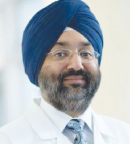
Navneet S. Majhail, MD, MS
Navneet S. Majhail, MD, MS, was born and reared in India, the son of a career military doctor. “Because my father would get various commissions in the military, we would have to move to different parts of India every 2 years or so. That experience certainly made me a more independent and adaptive child, as I would need to go through adjustments and the friend-making process with each move. Although some might think it would be difficult to continually create a new life, I loved it; it was exciting and rewarding,” said Dr. Majhail. “In the Indian school system, students are required to learn three languages—Indian, English, and a local language—and because of my father’s military career, that required continual relocations. I believe I had to learn about seven regional languages during my school years.”
NAVNEET S. MAJHAIL, MD, MS
Why a residency in radiation oncology? “In the 1990s, medical oncology was still in its infancy in India. However, radiation therapists delivered the full spectrum of cancer care, from chemotherapy to palliative care. It was a great learning experience.”
On finding true balance in his career: “The true balance for me centers on the patients who come to us at the most vulnerable times in their life. We have the honor to treat them and to make human-to-human contact. I don’t think there’s any other field as rewarding as oncology.”
Advice for young doctors starting their career: “No matter what field you specialize in, remember that, at the end of the day, it’s all about the patient. That’s why you became a doctor.”
Two Major Influences
Dr. Abraham asked whether there were any persons or events that sparked an interest in medicine, to which Dr. Majhail responded: “There were two distinct influences on my decision to become a doctor, and both involved my parents. As mentioned, my father was a general practitioner in the Indian army, and I recall his huge medicine cabinet in our house. When I played outside with my friends, invariably someone would get hurt, and I’d take the boy home, open my father’s medical cabinet, and tend to my wounded friend. I probably did a lot more than I should have, but that was the first thing to spark my interest in the medical profession.”
Dr. Majhail continued: “The second was my mother, who is a breast cancer survivor. She and my father had to relocate to a different city for her surgery, radiation, and chemotherapy, leaving me and my brother with family friends for about 6 months when I was in middle school. My mother’s experience with cancer had a lasting effect on me and was one of the reasons I decided to become an oncologist. In retrospect, that experience impressed on me the impact cancer has on the whole family, the uncertainty associated with this diagnosis, the importance of access, and the value of a good support and caregiver system. I feel I can better empathize with patients given that I can truly understand what they and their loved ones are going through.”
Professional Training in India
Dr. Majhail received his medical degrees from the Government Medical College, Chandigarh, India, and the All India Institute of Medical Sciences, New Delhi. “My medical school was in the city where my father was posted at the time, and I wanted to stay home, which was a major reason I decided to go to that medical school. It was a brand-new school, and I am actually from its first class. I went through all of the challenges and opportunities offered in a situation like that, being in a new school. It made me a more adaptive and stronger person.”
GUEST EDITOR
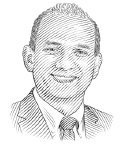
Dr. Abraham is the Director of the Breast Oncology Program at Taussig Cancer Institute, and Professor of Medicine, Lerner College of Medicine, Cleveland Clinic.
After medical school, Dr. Majhail was accepted into a radiotherapy residency at the All India Institute of Medical Sciences. “The reason I did a radiation oncology residency was simply because, in the 1990s, medical oncology was still in its infancy in India. However, radiation therapists, as they were called, delivered the full spectrum of cancer care, from chemotherapy to palliative care. When I went through the process, it was a great learning experience, and that’s when I realized my passion lay in medical oncology,” explained Dr. Majhail.
Next Career Move: The United States
During his residency, Dr. Majhail decided to take the U.S. medical licensure exam, at first because the test was given in Bangkok, Thailand; he would get 5 days off from his grueling residency schedule and have the chance to visit a foreign country. He’d never been outside of India.
“During my residency, I decided I wanted to pursue a career in hematology/oncology, and since there were limited training opportunities in India, I decided to go to the United States. I was fortunate enough to secure an internal medicine residency at the Cleveland Clinic, where I had the opportunity to work with several great faculty, whose mentorship reinforced my decision to become a hematologist.”
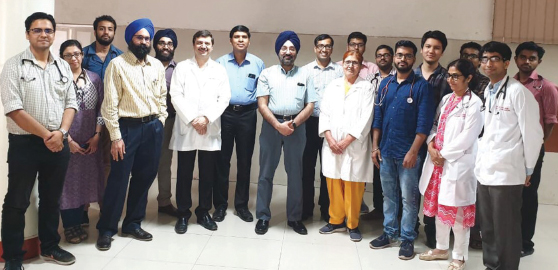
Visiting Professor at Postgraduate Institute of Medical Education and Research, Chandigarh, India (with faculty, trainees at their BMT program).
Dr. Majhail continued: “After my residency, I did a hematology-oncology fellowship at the University of Minnesota and also obtained an MS in Clinical Research there as well. As you know, the University of Minnesota is a pioneering institution in the field of hematopoietic cell transplantation. That’s where my interest in hematologic malignancies and blood and marrow transplantation fully matured.”
Dr. Majhail stressed the importance of mentorship, having been the beneficiary of mentors who helped shape his career. “My mentors say all they did was push me to reach my full potential, but I think they probably saw qualities in me that I didn’t see myself. I have to credit Drs. Dan Weisdorf and Linda Burns, both of whom really helped me find my niche in blood and marrow transplantation. My focus at the university was health services research in the context of blood and marrow transplantation and cellular therapy. In that process, I also became involved in the Center for International Blood and Marrow Transplant Research (CIBMTR), where I had the good fortune to have another mentor in Dr. Mary Horowitz, who is the center’s Chief Scientific Director. As I have become more involved in the administrative space, I always look up to advice from our Taussig Cancer Center Director, Dr. Brian Bolwell, who I consider to be my role model for academic leadership. Collectively, these individuals have had a more profound influence on my success than anyone else.”
Asked to elaborate on the importance of mentorship during a budding oncologist’s formative years, Dr. Majhail replied: “The first step is finding your true passion in medicine, which will be apparent during your training and will hopefully gain the attention of a senior faculty member who will take you under his or her mentorship. It is important to ask your peers about their experiences with different mentors, how supportive and available they’ve been, which to me is an underemphasized part of mentorship but hugely important.”
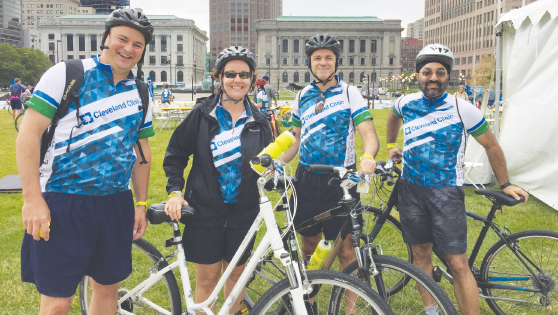
Riding in the VeloSano "Bike to Cure" event to raise funds for cancer research at the Cleveland Clinic.
Balancing a Busy Career
The issue of balancing different parts of his challenging day was raised by Dr. Abraham. “I don’t know if I’m able to find a true balance,” said Dr. Majhail. “I love research, but at heart, I am a clinician and relish time with patients. I also serve as Director of the Blood and Marrow Transplant Program at the Cleveland Clinic. But, at the end of the day, it’s all about the people in your team and the shared mission. Oncology and transplantation are collaborative disciplines, and everyone involved is devoted to the same goals. So, in my case, that’s what helps me balance my career and focus on making the field better. And then there’s the human element, the compassion of patient care. The true balance for me centers on the patients who come to us at the most vulnerable times in their life. We have the honor to treat them and to make human-to-human contact. I don’t think there’s any other field as rewarding as oncology.”
Multiple Hats
Along with his other responsibilities, Dr. Majhail is President of the American Society for Transplantation and Cellular Therapy (ASTCT). “It is an honor and a great opportunity to serve as President of this valuable society. It’s especially exciting during this period when our field is accelerating in new directions in every aspect of patient care across multiple diseases with emerging cellular therapies. Moreover, ASTCT is different from other societies in that it includes everyone who touches a patient undergoing blood and marrow transplantation or cellular therapy, such as physicians, researchers, advanced practice providers, pharmacists, nurses, administrators, social workers, and many others. Everyone is dedicated to the patient.”
Dr. Majhail continued: “The society also has a global outreach that gives us the opportunity to work with colleagues around the world. We have a lot of ongoing educational efforts throughout Asia, the Middle East, and South America. Working with people in middle- and low-income countries is a learning experience on both ends. The biggest challenge, naturally, is translating the costs of these new therapies into patient care in countries with such limited resources. It is difficult, and we still don’t have a handle on a solution. The true benefit of new and innovative cellular therapies won’t be realized until they are accessible to everyone.”
Follow Your Passion
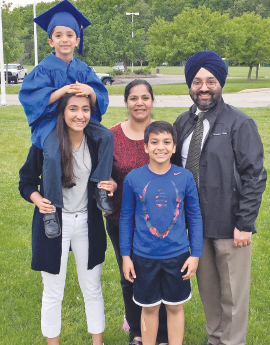
Dr. Majhail with his wife, Inder Raj, and three children, Gurnoor, Kavneer, and Ishmeet.
Asked what advice he has for young doctors at the beginning of their career, Dr. Majhail responded: “First and foremost, you need to find the niche you’re passionate about, because doing something you love will keep you fresh throughout your career. I’d also stress the need to remain humble as your career in academic medicine grows. Most important, no matter what field you specialize in, remember that, at the end of the day, it’s all about the patient. That’s why you became a doctor,” shared Dr. Majhail. “I would also tell young doctors something that I’m just now learning: the importance of taking care of oneself and finding personal ways to decompress and renew your energy. It’s one of the best ways to avoid burnout.”
What does a super-busy hematologist-oncologist do in his spare time? “I spend a lot of time on Twitter, maybe too much, but it’s a distraction that takes me away, if only for a few minutes at a time, but it helps. However, the most important thing for me is my family. My wife is a geriatric psychiatrist and is the rock of our family. We have three children and two dogs. No matter how challenging my day is, when I walk through the door and my kids hug me or my dogs greet me, it all gets put into perspective.”
DISCLOSURE: Dr. Majhail reported no conflicts of interest.

